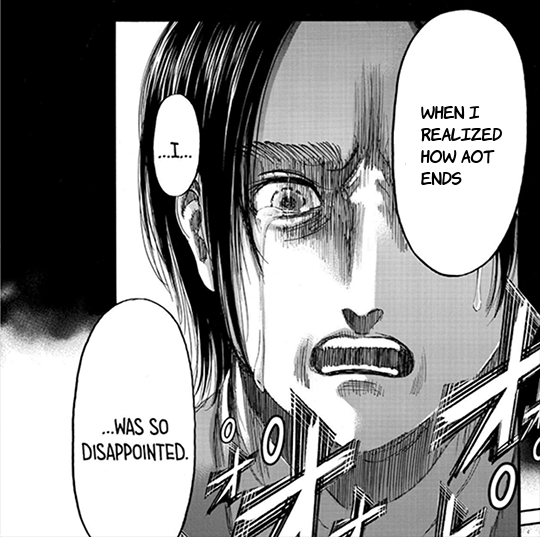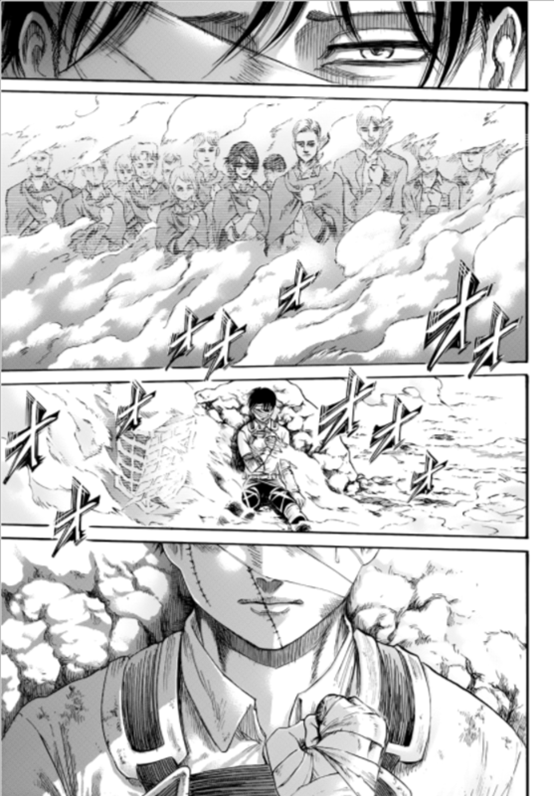MangaReview: (AoT) The Mediocre Ending for a Monumental Epic.

Spoiler Alert until Chapter 139.
This is the second day after reading the ending of AoT, and I am still not satisfied with its conclusion. The ending is not bad, but not good either. For one of the greatest works I have ever seen, I can say AoT deserves a much better ending. In what follows, I will try to explain why and how it could be better.
Before that, I feel necessary to reiterate that I don’t think the ending is bad. The problem is that AoT has reached a much higher level with its plot so far, and thus I expected a same-level ending while it only offers an average one. Objectively, it is not bad. Subjectively, I am unsatisfied. This is the point.
Incompletion
The last chapter gives me the impression of incompletion. Although I will discuss it in details later, I feel that this results from the rush of the late plots. In fact, I already felt impossible for a completion when it is said in January that there is only one volume left.
As expected, many things remain unexplained and confusing, and the last few chapters lost the rigorous story-telling and logic as it used to be. In addition, I personally feel unsatisfied with the incomplete emotion in the last chapter, and it seems a little bit inconsistent with my understanding about AoT.
Incomplete Plot
There are several incomplete setting and side-stories. They can be explained without a doubt, but will also be better if Isayama spends more time for the explanation. Some people may argue that the readers need to think for themselves, but as I see, a well-organized series should not need tons of texts for explanation after its end. There are some examples in the following.
First, why does 80 percent of the people need to be killed?
If you need to kill almost all people to protect the islanders, why not simply kill all of them? If Eren (or Ymir) kills all people outside the Paradis island, this could be considered a meaning of freedom as how Eren says in To the Other Side of the Wall (壁の向こう側へ), Ch. 90.
This can be followed by the meaning of Eren’s death. As explained in the last chapter, Eren dies as a villain for Armin to become the hero who saves the world. However, the world still sees the islanders as an enemy, and thus the war and conflicts will never end. If this is the case, does Eren die meaningless? Some people may argue that Isayama wants to illustrate how the reality works, but I think there can be a better illustration which I will propose later. Most importantly, it feels implausible to simply kill most others in the world and leave 20 percent of the population alive.
Some people would argue that Eren has no choice because it is Ymir who does, but this feels puzzling as well because Eren is able to control Dina from eating Bertolt, and it remains unexplained to what extent can Eren control everything. In addition, if Eren has no choice, then why didn’t he fight against it? This is far from how we know about Eren. If Eren in the end gives up, there needs an explanation for how he makes such decision because we all know that he never easily gives up.
The second one concerns Ymir’s purpose.
Well, this might be what needs explanation the most. In the last chapter, it is explained that Ymir keeps seeking for love and finds Mikasa, and Isayama leaves us a scene which happens right before Eren accidentally uses his power of the founding titan. However, it remains unclear what Ymir is exactly seeking for and why she finds Mikasa.
One explanation is that Ymir wants to find to what extent can one do for her lover. After seeing Mikasa being able to kill Eren, she then realizes that she does not have to follow Fritz’s order anymore, which leads to the ending. However, I think this is not convincing because she has been kept in that place for 2000 years.
I am not saying that love needs to make sense, but Isayama has always been good at illustrating the emotion of his character. It is one of the best scenes that Mikasa expresses her feeling to Eren by thanking him for wrapping the scarf around her. I believe Isayama can write another similar scene for Ymir while he did not. The plot is still understandable without a doubt, but deserves a better illustration.
The third one is about the ability to foresee the future.
There are at least three parts of the story talking about this. The Owl asks Grisha to keep loving others to save Mikasa and Armin, in Meeting (会議), Ch. 89. Grisha is able to interact with Eren and Zeke from the future, in Memories of the Future (未来の記憶), Ch. 121. Eren knows that the kid in front of him will be killed by the rumbling, in Rumbling (地鳴らし), Ch. 131.
I thought for a long time that Eren must have known something in the future, which leaves him no choice but to start the rumbling and sees his comrades (like Sasha) die and fight with one another, and this must have something to do with Ymir’s purpose.
I am half-right after the last chapter is released. Although it does have something to do with Ymir, Eren himself does not know anything. So you are telling me that Eren is also confused, but he knows that he has no choice but to destroy the world? This does not make sense after all. After all, it could have been better that Eren makes such decisions after seeing all of the possibilities.
By the way, the centipede is not also well-explained. Does it simply die after Eren dies? Maybe it does, but it also deserves more explanations, since it is the origin of the titans.
Incomplete Emotion
Let’s return to chapter 138 as the second last chapter, in which many people are turned into titans. There are then two possibilities, the devastatingly bad ending that it is all for nothing, and the one in chapter 139 that they return to their human forms. It is the latter after all, but I would choose the former one if I were the author.
The reason is how I understand AoT. I have always been addicted to the illustration of dead, depression and despair in AoT. I suffer from the plot concerning about this, but is also saved by the illustration of the meaning of life. I will say that this is what makes AoT very attractive. Those who are interested in this can read MangaReview: (AoT) Death, Depression, and Despair — The Salvation from Being Alive | by 哲學宅 Philosophy Otaku | Apr, 2021 | Medium.
In that article, I mentioned the death of Erwin. This part proposes the idea that no matter how good or meaningful one’s life is, death happens randomly. As a result, Erwin and Marlowe, who deserve being alive, simply die, while Floch, who does not even know what he is fighting for, simply survives.
We want Erwin and Marlowe to be alive because of their ideas and the philosophy for life, but they simply die because the stone thrown by the beast titan won’t choose its target. This is the illustration of how cruel the world could be. Death is equal to anyone, but it is the equality that makes it cruel.
This is the same in chapter 138. Although those who get turned into a titan have their own dreams and ideas, this will become nothing after becoming a titan. What’s worse, they are not chosen because they are good or bad. It is just because they are there by accident.
Take Gabi for example. She spends a long time and is finally free from being a slave of the hatred between races. However, she simply becomes a titan and it seems it is all for nothing. This kind of plots is consistent with how I understand AoT.
In other words, I am looking forward to that Isayama hurts me, the deeper the better. However, it does not really hurt in the end, and I am confused XD.
Although it feels inconsistent, it is still not too bad that everyone gets turned back, and people are somehow able to see the dead and say farewell. The world is not fully destroyed and the alive is then able to live a normal life. However, this path requires more chapters.
If you illustrate a devastatingly bad plot and decide to turn it upside down later, you need at least, say, three to five chapters for the readers to get their emotion into the right position. Isayama only spends two chapters for this, and this is why it feels incomplete and unsatisfactory.
A similar example is the death of Hannes in the anime adaptation. This part consists of some breathtaking scenes. Eren and Mikasa meet the titan who eats Eren’s mother. Hannes is given a chance to avenge Eren’s mother. Eren cannot become a titan. Hannes gets caught and is going to be eaten. Eren keeps trying but fails. Hannes is eaten. Eren cries. Mikasa expresses her feeling to Eren. Eren reacts to Mikasa. Eren somehow manages to control titans.
In fact, what I just mentioned takes probably less than five minutes to occur in the real world. Why, then, does WIT studio spends so much time on it and is considered one of the most memorable scenes? This is because of the emotion. Every sentence I used for explanation represents an emotion. When you turn from an emotion to another, you need time and convincing plots for the readers to get into that feeling. As a result, the anime adaptation spends more than half an episode illustrating this five-minute event.
It is great and consistent to remain hopeless from chapter 138, and needs more chapters for the real one in 139. This is what I want to argue for. I have to say that there are several unforgettable scenes in AoT, but the ending will not become one of them because of the incomplete emotion.
Possible Endings
I create some possible endings for myself because of the disappointment, based on the discussions I saw from different forums.
For Race:
In the last chapter when Armin is trying to explain to the soldiers, he fails and all of the Eldians get shot. Reiner sacrifices himself to protect Jean and tells him that he regrets killing Marco before his death. Falco also dies in front of Gabi.
The islanders got retaliatorily attack after several years since most people don’t believe that the titans have disappear. The islanders got massacred but some manage to escape because no one is able to distinguish between Eldians and non-Eldians. This race is forgotten after centuries, and titans are only discussed in the history books.
This can be what I mentioned about all for nothing. We just get some hope because everyone is turned back, but most of them get killed right after. The effort done by the main characters does not make any change in the end, like Erwin and Hannes. Gabi may get lost in hatred again because of the death of Falco. Jean will continue to live in regret like Reiner, because he has already forgiven Reiner during the final battle for what he has done to Marco.
This ending also can be the re-definition of the race issue from the Marley arc.
For Freedom:
(1) Eren seeks for freedom for the whole time, but cannot take the price in the end, or finds himself become the slave to freedom.
(2) The centipede’s purpose is to reproduce, but Ymir wants freedom, so she creates the attack titan who cannot be controlled, has the memories of all timelines, and will seek for freedom forever. She in the end finds Eren as the last inheritor, after 200 years, to kill the centipede for herself. However, Eren as the inheritor needs to die at the same time, and Eren has no choices because this timeline is the best.
This ending can remind us of the core idea along the whole story, freedom. It can also explain why the Owl tells Grisha to remember to love, or the tragedy will continue to happen.
(3) The rumbling kills all the other people and gives Eldians the true freedom, but the islanders keep suffering because of the great price. In addition, to keep Eldians from becoming titans, Eren needs to be killed or encloses himself in a crystal like Annie. If it is the crustal ending, the last scene must be that Mikasa asks Eren to sleep with a long dream, and what Eren first dreams about is Mikasa in the first chapter.
This ending can explain why Eren cries in the first chapter, and since he needs to sleep for a long time, Mikasa leaves a message as “To You, 2,000 Years From Now”.
Wonderful Illustration
No matter what kind of ending it is, how it is illustrated cannot be ignored. Although I make such complaint, I still want to praise Isayama’s illustration skill in the last chapter. Let’s see an example.

There is no word, but Levi’s emotion after a long journey is outstandingly illustrated. If you see more closely, you will even see a tear rolling down his face in the last scene. Isayama has always been good at making the storyboard from the beginning, and we can see how good he is here.
After all, I still want to say #ThankYouIsayama for making one of the greatest epic for me. All of my complaints come from my love to this work. I just love it so much that I need some time to recover.
Manga Review: The Humanity in Attack on Titan (Part I)-Philosophy | by 哲學宅 Philosophy Otaku | Medium
Manga Review: The Humanity in Attack on Titan (Part II)-History | by 哲學宅 Philosophy Otaku | Medium
